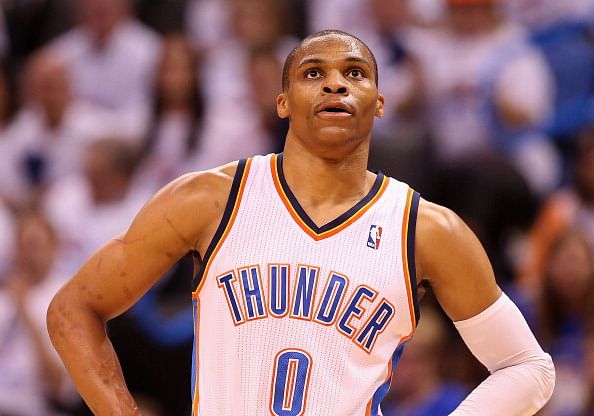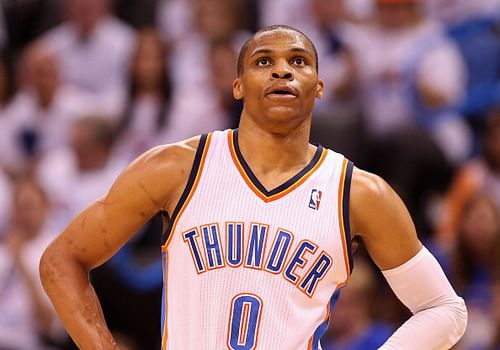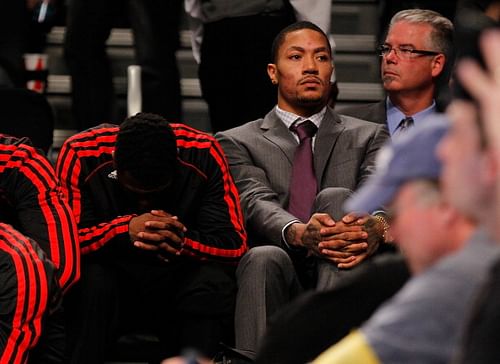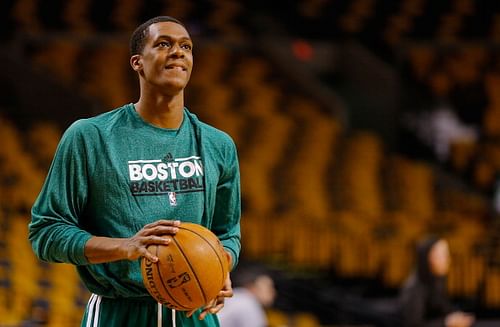
Everybody Hurts: The NBA’s Injury Crisis

Russell Westbrook doesn’t miss games. One of the most durable players in basketball history, Westbrook didn’t miss a single game for his High School in Lawndale, California, in two years for his college UCLA, or during the 439 regular season and playoff games that the Oklahoma City Thunder played since he got drafted in 2008. This is especially awe-inspiring considering that unlike the league’s previous ‘Iron Men’ to have played most consecutive games (AC Green, John Stockton, etc.), Westbrook has the most athletic and reckless style to his game.
So when the Thunder announced yesterday that Westbrook would be getting surgery for the torn meniscus in his knee and could be out for an extended period of time, the absurdity of injury crisis in the NBA this season reached its boiling point. Westbrook’s name has only been added to a growing list of NBA stars watching from the sidelines this season, which includes Kobe Bryant, Derrick Rose, Rajon Rondo, Kevin Love, Amar’e Stoudemire, Andrew Bynum, Danny Granger, David Lee, Danilo Gallinari, and many more. Put those names together in full health and you have a squad that can challenge any NBA All Star team. The growing number of these injuries had already been a serious problem across the league, but now as Westbrook goes down, the alarm bells start ringing even louder. If it can happen to Iron Man – a durable, young and healthy talent like him – it can happen to anyone.
But why is it happening?
 Physiotherapy, training, medical care, surgery, and injury-prevention exercises and drills have come a long way. Today’s NBA features the world’s most remarkably gifted athletes who have access to the world’s most remarkably forward-minded care to keep them healthy. Then why is it that, as we land into the most important stretch of the NBA Calendar, we find so many game-changing players watching in street clothes. It isn’t just the names mentioned above: serious injuries of various kinds struck Dwight Howard, Pau Gasol, Steve Nash, Dirk Nowitzki, John Wall, Eric Gordon, Ricky Rubio and Kyrie Irving over the past year. Are the NBA players doing something wrong, or have some voodoo magicians purposely cursed the league to suffer its worst stroke of luck ever?
Physiotherapy, training, medical care, surgery, and injury-prevention exercises and drills have come a long way. Today’s NBA features the world’s most remarkably gifted athletes who have access to the world’s most remarkably forward-minded care to keep them healthy. Then why is it that, as we land into the most important stretch of the NBA Calendar, we find so many game-changing players watching in street clothes. It isn’t just the names mentioned above: serious injuries of various kinds struck Dwight Howard, Pau Gasol, Steve Nash, Dirk Nowitzki, John Wall, Eric Gordon, Ricky Rubio and Kyrie Irving over the past year. Are the NBA players doing something wrong, or have some voodoo magicians purposely cursed the league to suffer its worst stroke of luck ever?
Injuries have halted or completely derailed the career of way too many potential superstars over the course of history. Grant Hill, Penny Hardaway, Ralph Sampson, Bill Walton, Yao Ming and Bernard King are just some great players who would’ve been headed towards far greater heights if they hadn’t gotten hurt. But today’s NBA players can enjoy the luxuries that many even in the recent past couldn’t. Players have access to a whole crew of Strength and Conditioning coaches, physicians, orthopedic surgeons, ophthalmologists, cardiologists, dentists, Yoga instructors, massage therapists, and other medical specialists as part of the team’s extended staff. They have fancy machines like the cyrosauna for ice baths and all types of additional paraphernalia for their body – from ankle bands to athletic body armour vests – to keep them intact and ready for action. Then why is it that modern players are still struggling to stay healthy, and are perhaps suffering from serious injuries more than ever before?
There is no clear answer to these questions; but one of my theories is that with all the injury-prevention, surgical, and post-injury support now available, the state of mind of many modern athletes has changed as compared to before. NBA players in earlier years perhaps had to be more careful about their bodies, knowing that even a minor injury could keep them out for the majority of the season, and hence played the game with a lot more conservatism. With the game evolving the way it is, featuring more and more athletic superhumans, the style of play by many has become more assertive and aggressive (like Wade, Rose, Westbrook, Wall, etc.), as players assume that no matter how recklessly they play, the human and technological support around them will keep them healthy and all their bones intact.
But the human body – no matter how miraculously strong it can seem – is a fragile piece of work, and sometimes even world-class preparation can’t save it from faulty landings or a nasty collisions. Basketball for the viewer is far more exciting with adventurous, reckless and strong play, and it is far more effective for those playing the game at an athletically higher level. But the continuing slew of injuries this season has shown the limitations to this extreme recklessness.
 Another oft-discussed reason is that many of the players who get injured might just be getting burned out from the long, dense regular season of playing close to 40 or more minutes per game. Players like Kobe, Rose and Westbrook are used to playing big minutes night in and night out when healthy; but the grueling nature of the competition means that even these tireless talents can put themselves at the risk of a serious injury. Kobe, for example, was playing between 45-48 minutes a night in crucial games towards the end of the regular season to ensure a post-season spot for the Lakers before his injury. Lakers’ Coach Mike D’Antoni has been accused in the past for running down Amar’e Stoudemire in Phoenix and New York in similar fashion. For Kobe, who had been battling with all kinds of injuries and mysterious surgeries over the past year, it wasn’t a surprise that he got hurt again. However, it was a surprise that he couldn’t bounce back immediately like he usually does.
Another oft-discussed reason is that many of the players who get injured might just be getting burned out from the long, dense regular season of playing close to 40 or more minutes per game. Players like Kobe, Rose and Westbrook are used to playing big minutes night in and night out when healthy; but the grueling nature of the competition means that even these tireless talents can put themselves at the risk of a serious injury. Kobe, for example, was playing between 45-48 minutes a night in crucial games towards the end of the regular season to ensure a post-season spot for the Lakers before his injury. Lakers’ Coach Mike D’Antoni has been accused in the past for running down Amar’e Stoudemire in Phoenix and New York in similar fashion. For Kobe, who had been battling with all kinds of injuries and mysterious surgeries over the past year, it wasn’t a surprise that he got hurt again. However, it was a surprise that he couldn’t bounce back immediately like he usually does.
The NBA’s schedule of 82 regular season games plus a maximum of 28 games in the post-season can test even the best of talents who have to play around three games a week. Played at a breath-taking pace with the previously-mentioned reckless abandon, it’s clear to see why so many coaches choose to rest their best players in less meaningful matches to keep them fresh and avoid unnecessary pain.
But apart from the evolving style of play and the challenges of a packed schedule, maybe the NBA has just been struck with the most confounding ailment of them all: bad luck. Freak injuries happen all the time, but for some reason, they have decided to happen all at the same time during the course of the 2012-13 season. Kevin Love broke his hand doing knuckle pushups. Awkward landings led to torn ACLs for Rose, Rondo, and Gallinari, and an Achilles tear for Kobe. Bynum and Stoudemire have had a history of bad knees, and that history continued into this season.
As a result of this luck, numerous teams can argue that they missed the playoffs because of injuries (76ers, Timberwolves, and for Wizards and Mavericks who started slow), many are struggling with a shorthanded roster in the first round (Celtics, Lakers), and the rest may never be able to achieve their full potential going forward because of their missing talent (Thunder, Nuggets, Warriors, Bulls, Knicks and Pacers – although for the latter two, the absence of Stoudemire and Granger hasn’t bothered them yet).
What we are left with, unfortunately, is the hollow feeling of an inferior product. Yes, it’s great fun to see LeBron James and Dwyane Wade run a fastbreak, but I also want to see Kobe Bryant hit tough jumpers. We have two of the most natural scorers of all time in Kevin Durant and Carmelo Anthony lighting up the league, but the playoffs would’ve been more competitive with Derrick Rose and Rajon Rondo also running the show.
In the true spirit of competition, each squad should be able to play with its full potential with all the available talent at the highest possible level. Until recently, we could assume that some teams and players have just done a better job at preparing for their physical health for a big playoff run. But when a guy likes Westbrook goes down, even all that preparation and durability leaves you with the same, unfortunate result.
Of course, the show must go on, and no one feels any sympathy for anyone else in the world of professional basketball. Still, we can look up and question the Basketball Gods for depriving us of some fantastic players this year. After all, it’s the year ’13, isn’t yet? Hopefully the curse will pass us by next year, and we can have a season where talent and teamwork matters more than a health crisis.